Power pop is a subgenre of rock music and a form of pop rock based on the early music of bands such as the Who, the Beatles, the Beach Boys, and the Byrds. It typically incorporates melodic hooks, vocal harmonies, an energetic performance, and cheerful sounding music underpinned by a sense of yearning, longing, despair, or self-empowerment. The sound is primarily rooted in pop and rock traditions of the early-to-mid 1960s, although some artists have occasionally drawn from later styles such as punk, new wave, glam rock, pub rock, college rock, and neo-psychedelia.

Cheap Trick is an American rock band from Rockford, Illinois, formed in 1973 by guitarist Rick Nielsen, bassist Tom Petersson, lead vocalist Robin Zander and drummer Bun E. Carlos. The current lineup of the band consists of Zander, Nielsen and Petersson. Their work bridged elements of '60s guitar pop, hard rock, and punk rock, and would help set the template for subsequent power pop artists.

Cheap Trick at Budokan is the first live album by American rock band Cheap Trick, and their best-selling recording. Recorded at the Nippon Budokan in Tokyo, the album was first released in Japan on October 8, 1978, and later released in the United States in February 1979, through Epic Records. After several years of constant touring but only middling exposure for the band, At Budokan steadily grew off radio play and word-of-mouth to become a high-selling success, kickstarting the band's popularity and becoming acclaimed as one of the greatest live rock albums of all time and a classic of the power pop genre.
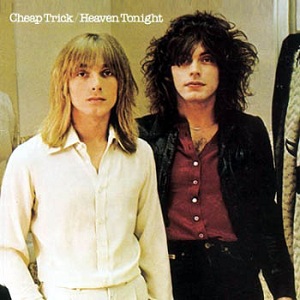
Heaven Tonight is the third studio album by American rock band Cheap Trick. It was produced by Tom Werman and released on April 24, 1978. The album was remastered and released with bonus tracks on Sony's Epic/Legacy imprint in 1998. The album cover features lead singer Robin Zander and bassist Tom Petersson on the front, with guitarist Rick Nielsen and drummer Bun E. Carlos on the back.

"Ain't That a Shame" is a song written by Fats Domino and Dave Bartholomew. Domino's recording of the song, originally stated as "Ain't It a Shame", released by Imperial Records in 1955, was a hit, eventually selling a million copies. It reached number 1 on the Billboard R&B chart and number 10 on the pop chart. The song is ranked number 438 on Rolling Stone magazine's 500 Greatest Songs of All Time list.

"I Want You to Want Me" is a song by the American rock band Cheap Trick. It is originally from their second album In Color, released in September 1977. It was the first single released from that album, but it did not chart in the United States in its original studio version, which was influenced by music hall styles.
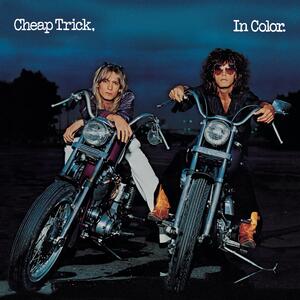
In Color is the second studio album by Cheap Trick, released in 1977 and produced by Tom Werman.

"Dream Police" is a song written by Rick Nielsen and originally released in 1979 by the American rock band Cheap Trick. It is the first track on the group's album of the same name. The single peaked at #26 on the Billboard Hot 100. Nielsen has stated that the song "is an attempt to take a heavy thought - a quick bit of REM snatched right before waking up - and put into a pop format." He also stated that "the song was about Big Brother watching you."
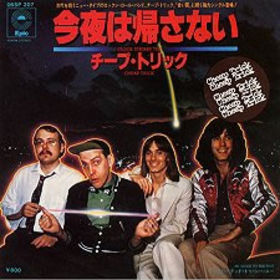
"Clock Strikes Ten" is a song released in 1977 by Cheap Trick on their second album, In Color. It was written by Cheap Trick guitarist Rick Nielsen. It was released as a single in Japan, where it was a major hit and reached No. 1 on at least one singles chart. Its success, as well as the success of two follow up singles, "I Want You to Want Me" and "Surrender", paved the way for Cheap Trick's famous concerts at Nippon Budokan in Tokyo in April 1978 that were recorded for the group's most popular album - Cheap Trick at Budokan.
"Hello There" is a song written by Rick Nielsen and first released on Cheap Trick's 1977 album, In Color. The song was also often used as the first song of Cheap Trick concerts, and as a result was the first song on the band's seminal live album Cheap Trick at Budokan.

"Voices" is a song written by Rick Nielsen and recorded by American rock band Cheap Trick which appeared on the album Dream Police. The single was released in 1979 and peaked at number 32 in the US. The single has become one of the band's more widely known tracks.
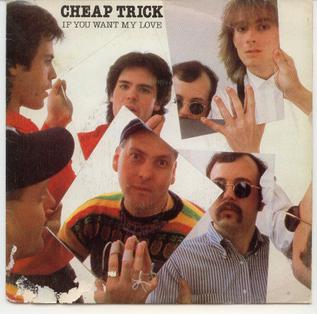
"If You Want My Love" is a song by American rock band Cheap Trick, released in 1982 as the lead single from their sixth studio album One on One. It was written by guitarist Rick Nielsen and produced by Roy Thomas Baker. It reached number 45 on the US Billboard Hot 100 and number 2 on the Australian Kent Music Report chart.
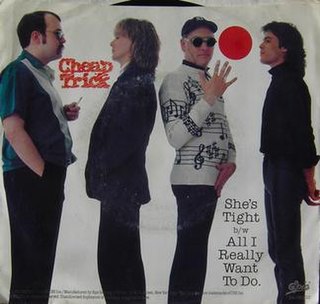
"She's Tight" is a song by the American rock band Cheap Trick, which was released in 1982 as the third single from their studio album One on One. It was written by guitarist Rick Nielsen and produced by Roy Thomas Baker. It reached No. 65 on the Billboard Hot 100 Chart.

"Auf Wiedersehen" is a song co-written by Cheap Trick guitarist Rick Nielsen and bassist Tom Petersson and first released on the band's 1978 album Heaven Tonight. It was also released as a single as the B-side of "Surrender". Since its original release, it has also been released by Cheap Trick on several live and compilation albums, including Budokan II; Sex, America, Cheap Trick; The Essential Cheap Trick, and the 30th Anniversary Edition of Cheap Trick at Budokan, which also includes a DVD with a video performance of the song. Allmusic critic Stephen Thomas Erlewine described the song as one of the peaks of Heaven Tonight and as one of Cheap Trick's "stone-cold classics." It has often been used by the band to close their concerts. Since its original release, it has been covered by Anthrax, Cell, John Easdale, and Steel Pole Bath Tub.

"Tonight It's You" is a song by American rock band Cheap Trick, which was released in 1985 as the lead single from their eighth studio album Standing on the Edge. It was written by Rick Nielsen, Robin Zander, Jon Brant and Mark Radice, and produced by Jack Douglas. "Tonight It's You" reached No. 44 on the US Billboard Hot 100 and No. 8 on the Billboard Top Rock Tracks Chart.

"Never Had a Lot to Lose" is a song by the American rock band Cheap Trick, which was released in 1989 as the fifth and final single from their tenth studio album Lap of Luxury (1988). It was written by lead vocalist Robin Zander and bassist Tom Petersson, and produced by Richie Zito. The song reached No. 75 on the Billboard Hot 100.

"You're All I Wanna Do" is a song by American rock band Cheap Trick, which was released in 1994 as the second single from their twelfth studio album Woke Up with a Monster. The song was written by Jim Peterik, Rick Nielsen, Robin Zander, Terry Reid and Tom Petersson, and produced by Ted Templeman.

"I Can't Take It" is a song by the American rock band Cheap Trick, which was released in 1983 as the second single from their seventh studio album Next Position Please. The song was written by Robin Zander and produced by Todd Rundgren.
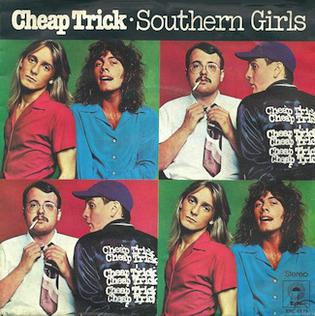
"Southern Girls" is a song written by Rick Nielsen and Tom Petersson that was first released by Cheap Trick on their 1977 album In Color, produced by Tom Werman. It was also released as a single. It has been covered by a number of artists, including Bangs, Everclear and Gilby Clarke.

"Let's Pretend" is a song by Raspberries, released in March 1973 as the second single from their second LP, Fresh. It was written by band leader Eric Carmen, who also provided the lead vocals.


















